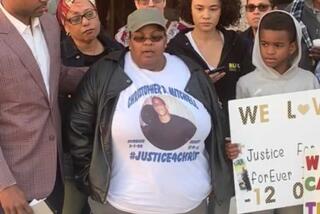Related story: Supreme Court upholds police shooting after high-speed car chase
- Share via
Reporting from Washington — The police may use deadly force to shoot and kill a motorist who leads them on a reckless, high-speed chase, even if the suspect’s car is temporarily cornered, the Supreme Court ruled Tuesday.
In a unanimous decision, the justices threw out an “excessive force” claim brought against Arkansas police officers who chased a speeding car across the bridge into Memphis and shot the driver when he refused to give up.
In the past, the court had said police may use force to stop a fleeing motorist because he represents a danger to the public. But the law has been unclear on whether “deadly force” can be used against the occupants of a stopped car.
In the case decided Tuesday, Justice Samuel A. Alito Jr. said the officers were justified in shooting the motorist because he continued to maneuver his car after he had been temporarily stopped by a squad car. As the motorist, Donald Rickard, tried to drive away, police fired 15 shots in all, killing him and a passenger.
Alito also said officers deserve the benefit of the doubt when they are engaged in a high-speed pursuit. “We analyze this question from the perspective of a reasonable officer on the scene, rather than with the 20/20 vision of hindsight,” he wrote in Plumhoff v. Rickard.
The case began on a summer night in 2004 when officers in West Memphis, Ark., pulled over a white Honda because the car had only one headlight. When an officer sought to question the driver, he sped away.
The chase reached 100 miles per hour when Rickard crossed the bridge into Memphis. Sgt. Vance Plumhoff led the pursuit and collided with the fleeing vehicle, sending it spinning into a parking lot.
Though Rickard’s car was cornered, he put it into reverse and spun the wheels. When Rickard refused to surrender, Plumhoff fired three shots into the vehicle. The car then spun away, and officers fired more shots, killing the driver and his passenger.
Rickard’s daughter sued, alleging the officers violated the 4th Amendment by using “excessive force” to make an arrest. A federal judge and the 6th Circuit Court of Appeals allowed the suit to proceed on the theory that a jury should decide whether the shooting was excessive.
But the Supreme Court decided there was no constitutional violation. “It is beyond serious dispute that Rickard’s flight posed a grave public safety risk, and here the police acted reasonably in using deadly force to end that risk,” Alito wrote. It would be “a different case,” he added, if the initial shots “had clearly incapacitated Rickard” or “if Rickard had clearly given himself up.”
“But that is not what happened,” he concluded.
More to Read
Sign up for Essential California
The most important California stories and recommendations in your inbox every morning.
You may occasionally receive promotional content from the Los Angeles Times.











